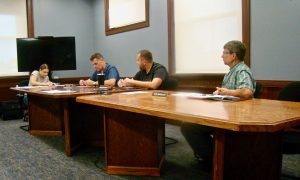WESTFIELD – The Water Commission approved two change orders Tuesday night to on-going construction projects, one of which will substantially deplete the Water Resource Department’s water construction account.
Change orders are amendments to contracts, typically additional funding requested by the contractor to address conditions or circumstances that were not known when the city advertised the project contract and not covered in the scope of the construction bid.
The first change order, to the Elm Street water main and sidewalk improvement project for $12,704, is an example of additional work being required because of discovery of an undocumented asbestos line under Summer Street.
“Nobody knew it was under there,” Dave Billips, Water Resource superintendent, said Tuesday. “But that’s not unusual, it often happens in these type of projects.”
Several undocumented utility lines, some long abandoned, were discovered during excavation in one of the oldest parts of the city. The failing asbestos line now requires remediation of any significant environmental impact.
“They found more when they got into it,” Billips said.
The bond approved for the project includes a contingency fund, normally between 10 and 15 percent of the engineering estimated project cost since the city is required to approve the financing before the project is actually released for bidding. The funding to install a new water line and for any required remediation of the soil under Summer Street will be covered by the contingency fund built into the project financing.
However, the second change order, for a substantially larger amount of money, is not covered by that contingency financing safety net.
The Water Commission, with a great deal of reservation, approved a change order of $110,264 for “adjustments” to the department’s portion of the Main and Broad street reconstruction project, funding that will come from the department’s construction account.
The $15 million Main and Broad street project was funded through the American Recovery and Reinvestment Act, federal money poured into public works projects to stimulate the economy. The project did not include contingency funding because of federal laws
Assistant City Engineer Heather Miller said the city attempted to secure federal funding for the additional work, but attempt was made in vain
“So it has to come from the Water Department funds,” Miller said.
Commissioner Michael Burns Sr., asked Billips to identify the department’s line item that would cover the $112,264.
Billips replied that it would most likely be paid through the department’s construction account which currently has $290 available.
Commission Chairman Ronald Cole asked if that would leave the department with sufficient funding to response to a major project, especially emergency repairs to the city’s water distribution system which includes lines, pumping stations, two treatment facilities and water storage tanks.
Billips said that the department may have to request Mayor Daniel M. Knapik and the City Council for approval to transfer funding from the department’s reserve account to the construction account.
Cole said that he “would not feel comfortabl”‘ draining the construction account down to $180,000 unless there was a mechanism to restore funding.
Billips said that he typically seeks additional funding in December or January every year because of state mandated law which requires the department’s budget not to exceed the total revenue of the previous fiscal year.
“We had to cut the budget this year because of that,” he said.
The funding cut from the budget is moved to the department’s reserve account and requires a City Council vote to be moved to other line items every year.
The commission voted 3-0 to approve the change order.







